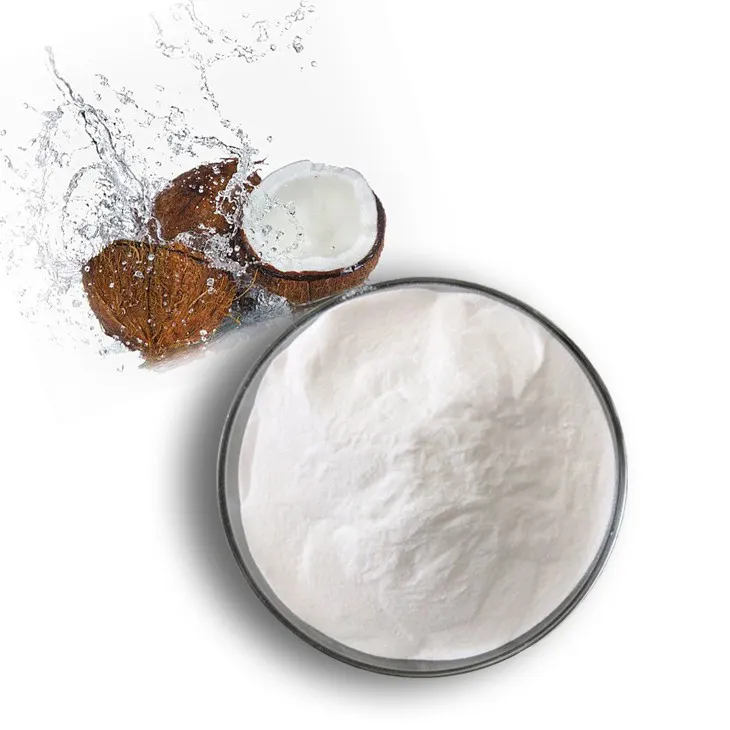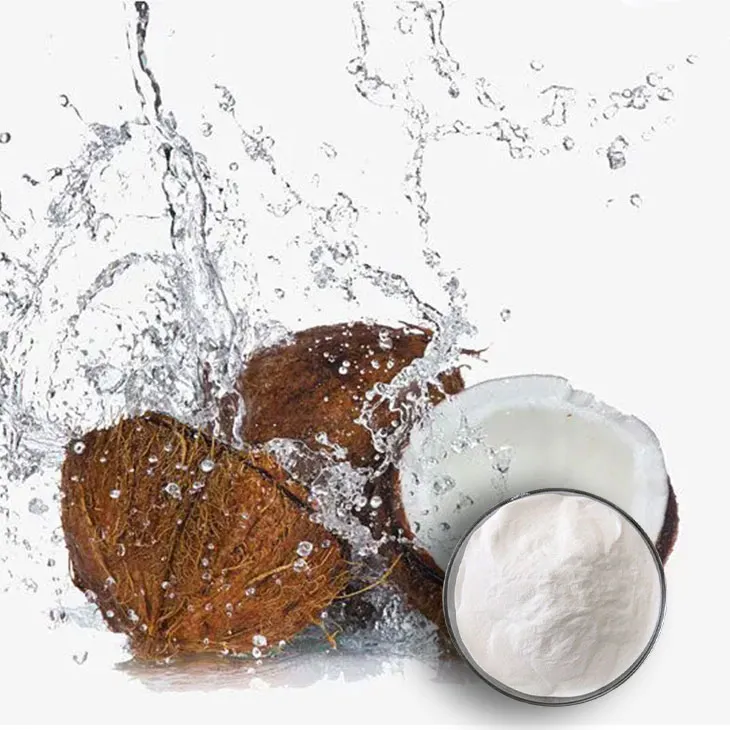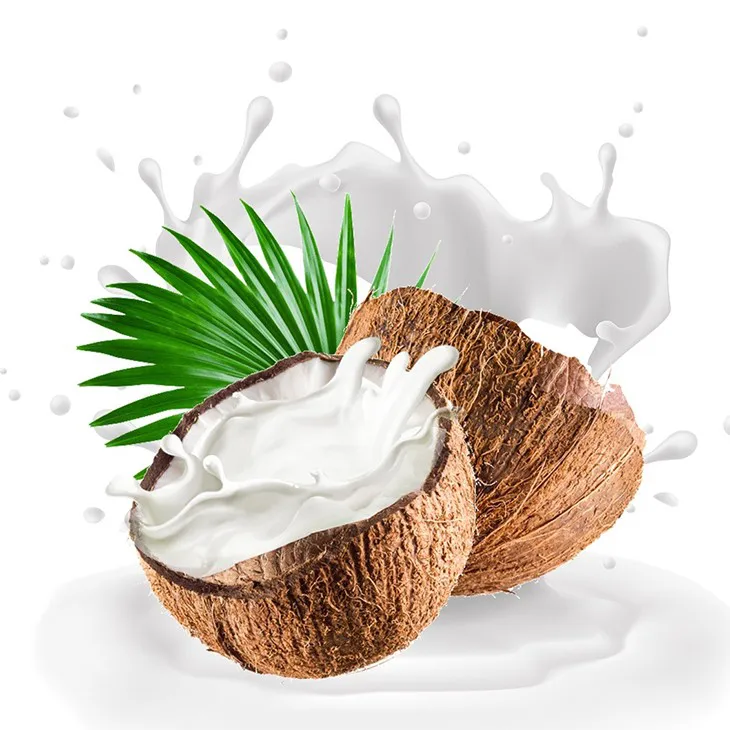- 0086-571-85302990
- sales@greenskybio.com
Eco-Friendly Harvest: The Environmental Footprint of Coconut Water Powder Production
2024-07-04

1. Introduction
Coconut Water Powder has emerged as a highly sought - after product in recent years, finding its way into a wide range of consumer products such as sports drinks, health supplements, and culinary creations. However, as the demand for this product continues to soar, the environmental implications of its production have largely been overlooked. This article aims to provide a comprehensive examination of the eco - friendly aspects of Coconut Water Powder production, delving into the various stages from farming to packaging and highlighting the importance of minimizing the ecological footprint in this burgeoning industry.

2. Farming Methods and Their Environmental Impact
2.1. Traditional vs. Sustainable Farming
Traditional Farming: In many regions where coconuts are grown, traditional farming methods have been in place for generations. These often involve the use of chemical fertilizers and pesticides to boost yields. Chemical fertilizers can have a significant negative impact on the environment. For instance, they can leach into the soil and contaminate groundwater, leading to water pollution. Pesticides, on the other hand, can harm non - target organisms such as beneficial insects and birds, disrupting the local ecosystem.
Sustainable Farming: In contrast, sustainable farming practices offer a more environmentally friendly approach. Organic farming of coconuts, for example, involves the use of natural fertilizers like compost and manure. This not only enriches the soil but also reduces the risk of chemical runoff. Additionally, integrated pest management (IPM) techniques can be employed. IPM focuses on preventing pest problems through methods such as crop rotation, biological control (using natural predators of pests), and the use of resistant coconut varieties. By reducing the reliance on chemical pesticides, it helps to preserve the biodiversity of the farming area.
2.2. Water Usage in Coconut Farming
Coconut trees are generally considered to be relatively drought - tolerant, but they still require a significant amount of water, especially during the early growth stages and in dry regions. Irrigation practices play a crucial role in determining the environmental footprint of coconut farming.
- Inefficient irrigation systems, such as flood irrigation, can lead to water wastage. Water may run off the fields, taking with it valuable topsoil and nutrients. - Drip irrigation, on the other hand, is a more sustainable option. It delivers water directly to the root zone of the coconut trees, minimizing evaporation and runoff. This method not only conserves water but also ensures that the trees receive a consistent supply of moisture, promoting healthy growth.

3. Processing Techniques and Their Environmental Consequences
3.1. Extraction of Coconut Water
The extraction of coconut water is the first step in the production of Coconut Water Powder. There are different methods for this extraction, each with its own environmental implications.
- Manual extraction: In some traditional settings, coconuts are opened by hand, and the water is collected. While this method is relatively low - tech, it can be time - consuming and may not be suitable for large - scale production. However, it has the advantage of being a more natural process with minimal use of machinery and energy. - Mechanical extraction: Modern large - scale production often relies on mechanical devices to extract coconut water. These machines can be energy - intensive, contributing to the overall carbon footprint of the production process. However, technological advancements are being made to improve the energy efficiency of these extraction machines.
3.2. Concentration and Drying Processes
After extraction, the coconut water needs to be concentrated and dried to form a powder.
- Thermal concentration and drying methods are commonly used. However, these processes typically require a significant amount of heat energy, which is often sourced from non - renewable energy sources such as fossil fuels. This not only consumes energy but also releases greenhouse gases into the atmosphere. - Alternative methods such as freeze - drying are being explored. Freeze - drying is a more energy - intensive process in terms of initial investment and operation, but it has the potential to preserve more of the nutritional value of the coconut water and can be powered by renewable energy sources, making it a more environmentally friendly option in the long run.

4. Packaging and Its Environmental Impact
4.1. Types of Packaging
Coconut water powder is packaged in a variety of materials, each with different environmental characteristics.
- Plastic packaging is widely used due to its convenience and low cost. However, plastic is a major environmental concern as it is not biodegradable and can take hundreds of years to decompose. Additionally, the production of plastic packaging often involves the use of non - renewable resources and can release harmful chemicals during its manufacturing process. - Paper - based packaging, on the other hand, is a more sustainable option. It is biodegradable and can be sourced from sustainably managed forests. However, it may not offer the same level of protection against moisture and oxygen as plastic, which can affect the shelf - life of the coconut water powder.
4.2. Packaging Design for Minimizing Waste
- Optimal packaging size is an important consideration. Over - sized packaging not only uses more materials but also takes up more space during transportation, increasing the carbon footprint associated with shipping. By determining the appropriate amount of product per package, waste can be minimized. - Re - usable or recyclable packaging can also play a significant role in reducing the environmental impact. For example, packaging that can be easily recycled or used for other purposes after the product has been consumed can help to divert waste from landfills.
5. Importance of Minimizing the Ecological Footprint in the Coconut Water Powder Industry
- Environmental Conservation: Minimizing the ecological footprint of coconut water powder production is crucial for the long - term conservation of the environment. By adopting sustainable farming methods, energy - efficient processing techniques, and environmentally friendly packaging, we can reduce the impact on natural resources such as water, soil, and forests. - Meeting Consumer Demand for Sustainability: In today's market, consumers are increasingly conscious of the environmental impact of the products they purchase. A company that can demonstrate a commitment to eco - friendly production of coconut water powder is likely to attract more environmentally - conscious consumers, thereby gaining a competitive edge. - Sustainable Development Goals: The coconut water powder industry can contribute to global sustainable development goals by reducing its environmental footprint. This includes goals related to climate change mitigation, sustainable agriculture, and responsible consumption and production.
6. Conclusion
As the demand for coconut water powder continues to grow, it is essential that the industry takes steps to minimize its environmental footprint. From the farms where coconuts are grown to the final packaging of the powder, every stage of production offers opportunities for more sustainable practices. By embracing sustainable farming methods, improving processing techniques to be more energy - efficient, and choosing environmentally friendly packaging, the coconut water powder industry can not only reduce its impact on the environment but also thrive in an increasingly eco - conscious market.
FAQ:
1. What are the common farming methods for coconuts in relation to coconut water powder production and how do they impact the environment?
Traditional coconut farming often involves methods like monoculture. Monoculture can deplete soil nutrients over time, requiring more fertilizers which may have negative environmental impacts such as water pollution if not managed properly. Organic farming methods, on the other hand, are more environmentally friendly as they use natural fertilizers and pest control, reducing chemical runoff. However, organic farming may have lower yields compared to conventional methods in some cases.
2. How do processing techniques in coconut water powder production influence the environmental footprint?
Some processing techniques may require a large amount of energy, such as heat - drying processes. High - energy consumption contributes to greenhouse gas emissions. Moreover, if chemicals are used in the processing for preservation or purification, improper disposal of waste from these chemicals can contaminate soil and water. However, more advanced and sustainable processing techniques like freeze - drying are being developed which consume less energy and are more environmentally friendly.
3. What role does packaging play in the environmental footprint of coconut water powder?
Packaging can have a significant impact. Single - use plastic packaging, which is commonly used, is not biodegradable and can end up in landfills or the ocean, causing pollution. Alternatives like biodegradable or recyclable packaging materials are better options. However, biodegradable packaging may require specific conditions for proper decomposition, and recyclable packaging depends on effective recycling systems to be truly environmentally friendly.
4. How can the ecological footprint of coconut water powder production be minimized?
To minimize the ecological footprint, farmers can adopt sustainable farming practices like agroforestry, which combines coconut cultivation with other plants to improve soil fertility and biodiversity. In processing, using energy - efficient technologies and reducing chemical use is crucial. For packaging, choosing recyclable or biodegradable materials and reducing overall packaging waste are important steps. Additionally, promoting local consumption can reduce the carbon footprint associated with transportation.
5. Are there any certifications or standards for environmentally friendly coconut water powder production?
Yes, there are some certifications. For example, organic certifications ensure that the coconuts are grown without synthetic pesticides and fertilizers. Fairtrade certifications also play a role as they promote sustainable farming practices and fair treatment of farmers. These certifications help consumers identify products that are produced with more environmental and social responsibility.
Related literature
- Sustainable Coconut Farming: A Review of Practices and Impacts"
- "The Environmental Impact of Food Processing: The Case of Coconut Water Powder"
- "Packaging Solutions for a Greener Coconut Water Powder Industry"
- ▶ Hesperidin
- ▶ Citrus Bioflavonoids
- ▶ Plant Extract
- ▶ lycopene
- ▶ Diosmin
- ▶ Grape seed extract
- ▶ Sea buckthorn Juice Powder
- ▶ Fruit Juice Powder
- ▶ Hops Extract
- ▶ Artichoke Extract
- ▶ Mushroom extract
- ▶ Astaxanthin
- ▶ Green Tea Extract
- ▶ Curcumin
- ▶ Horse Chestnut Extract
- ▶ Other Product
- ▶ Boswellia Serrata Extract
- ▶ Resveratrol
- ▶ Marigold Extract
- ▶ Grape Leaf Extract
- ▶ New Product
- ▶ Aminolevulinic acid
- ▶ Cranberry Extract
- ▶ Red Yeast Rice
- ▶ Red Wine Extract
-
Shikone Extract
2024-07-04
-
Mangosteen extract powder
2024-07-04
-
Echinacea Extract
2024-07-04
-
Withania Somnifera Extract
2024-07-04
-
Lotus leaf extract
2024-07-04
-
Yohimbine Bark Extract
2024-07-04
-
Cassia Seed Extract
2024-07-04
-
Baicalin
2024-07-04
-
Cocoa Extract
2024-07-04
-
Grape Seed Extract
2024-07-04





















